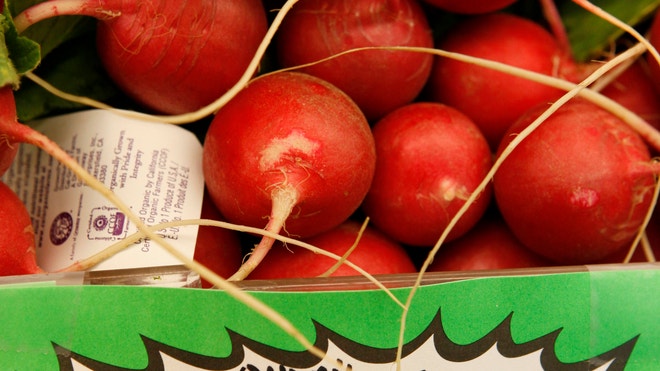threetri333
Banned
http://www.foxnews.com/health/2012/...anic-food-is-no-better-on-vitamins-nutrients/

I was wondering if no chemicals are used, then how do farmers keep the bugs out? I don't want to pay a premium price if there aren't much benefits eating organic foods.
This is an old article, but a friend warned me about purchasing organic foods. I'm convinced we're paying more just for the word "Organic". What do you guys think?
Patient after patient asked: Is eating organic food, which costs more, really better for me?
Unsure, Stanford University doctors dug through reams of research to find out -- and concluded there's little evidence that going organic is much healthier, citing only a few differences involving pesticides and antibiotics.
Eating organic fruits and vegetables can lower exposure to pesticides, including for children -- but the amount measured from conventionally grown produce was within safety limits, the researchers reported Monday.
Nor did the organic foods prove more nutritious.
"I was absolutely surprised," said Dr. Dena Bravata, a senior research affiliate at Stanford and long-time internist who began the analysis because so many of her patients asked if they should switch.
"There are many reasons why someone might choose organic foods over conventional foods," from environmental concerns to taste preferences, Bravata stressed. But when it comes to individual health, "there isn't much difference."
Her team did find a notable difference with antibiotic-resistant germs, a public health concern because they are harder to treat if they cause food poisoning.
Specialists long have said that organic or not, the chances of bacterial contamination of food are the same, and Monday's analysis agreed. But when bacteria did lurk in chicken or pork, germs in the non-organic meats had a 33 percent higher risk of being resistant to multiple antibiotics, the researchers reported Monday in the journal Annals of Internal Medicine.
That finding comes amid debate over feeding animals antibiotics, not because they're sick but to fatten them up. Farmers say it's necessary to meet demand for cheap meat. Public health advocates say it's one contributor to the nation's growing problem with increasingly hard-to-treat germs. Caroline Smith DeWaal, food safety director at the Center for Science in the Public Interest, counted 24 outbreaks linked to multidrug-resistant germs in food between 2000 and 2010.
The government has begun steps to curb the nonmedical use of antibiotics on the farm.
Organic foods account for 4.2 percent of retail food sales, according to the U.S. Department of Agriculture. It certifies products as organic if they meet certain requirements including being produced without synthetic pesticides or fertilizers, or routine use of antibiotics or growth hormones.
Consumers can pay a lot more for some organic products but demand is rising: Organic foods accounted for $31.4 billion sales last year, according to a recent Obama administration report. That's up from $3.6 billion in 1997.
The Stanford team combed through thousands of studies to analyze the 237 that most rigorously compared organic and conventional foods. Bravata was dismayed that just 17 compared how people fared eating either diet while the rest investigated properties of the foods themselves.
Organic produce had a 30 percent lower risk of containing detectable pesticide levels. In two studies of children, urine testing showed lower pesticide levels in those on organic diets. But Bravata cautioned that both groups harbored very small amounts -- and said one study suggested insecticide use in their homes may be more to blame than their food.
Still, some studies have suggested that even small pesticide exposures might be risky for some children, and the Organic Trade Association said the Stanford work confirms that organics can help consumers lower their exposure.
CSPI's DeWaal noted that difference, but added that the issue is more complicated. Some fruits and vegetables can harbor more pesticide residue than others -- she listed peaches from Chile as topping a recent testing list. Overall levels have dropped in North American produce over the last decade as farms implemented some new standards addressing child concerns, she said.
"Parents with young children should consider where their produce is coming from," DeWaal said, calling types grown in the U.S. or Canada "a safer bet" for lower pesticide levels.
As for antibiotics, some farms that aren't certified organic have begun selling antibiotic-free meat or hormone-free milk, to address specific consumer demands, noted Bravata. Her own preference is to buy from local farmers in hopes of getting the ripest produce with the least handling.
That kind of mixed approach was evident in a market in the nation's capital Thursday, where Liz Pardue of Washington said she buys organic "partially for environmental reasons." Pardue said she doesn't go out of her way to shop organic, but if she does, it's to buy mostly things that are hard to wash like berries and lettuce.
Michelle Dent of Oxon Hill, Md., said she buys most of her groceries from regular chain stores but gets her fruit from organic markets: "It's fresh; you can really taste it."
Anna Hamadyk of Washington said she buys only organic milk because she has a young son.
"I would love to buy everything organic, but it's just too much money," said Hamadyk, who also shops at local farmers markets.
I was wondering if no chemicals are used, then how do farmers keep the bugs out? I don't want to pay a premium price if there aren't much benefits eating organic foods.
This is an old article, but a friend warned me about purchasing organic foods. I'm convinced we're paying more just for the word "Organic". What do you guys think?
